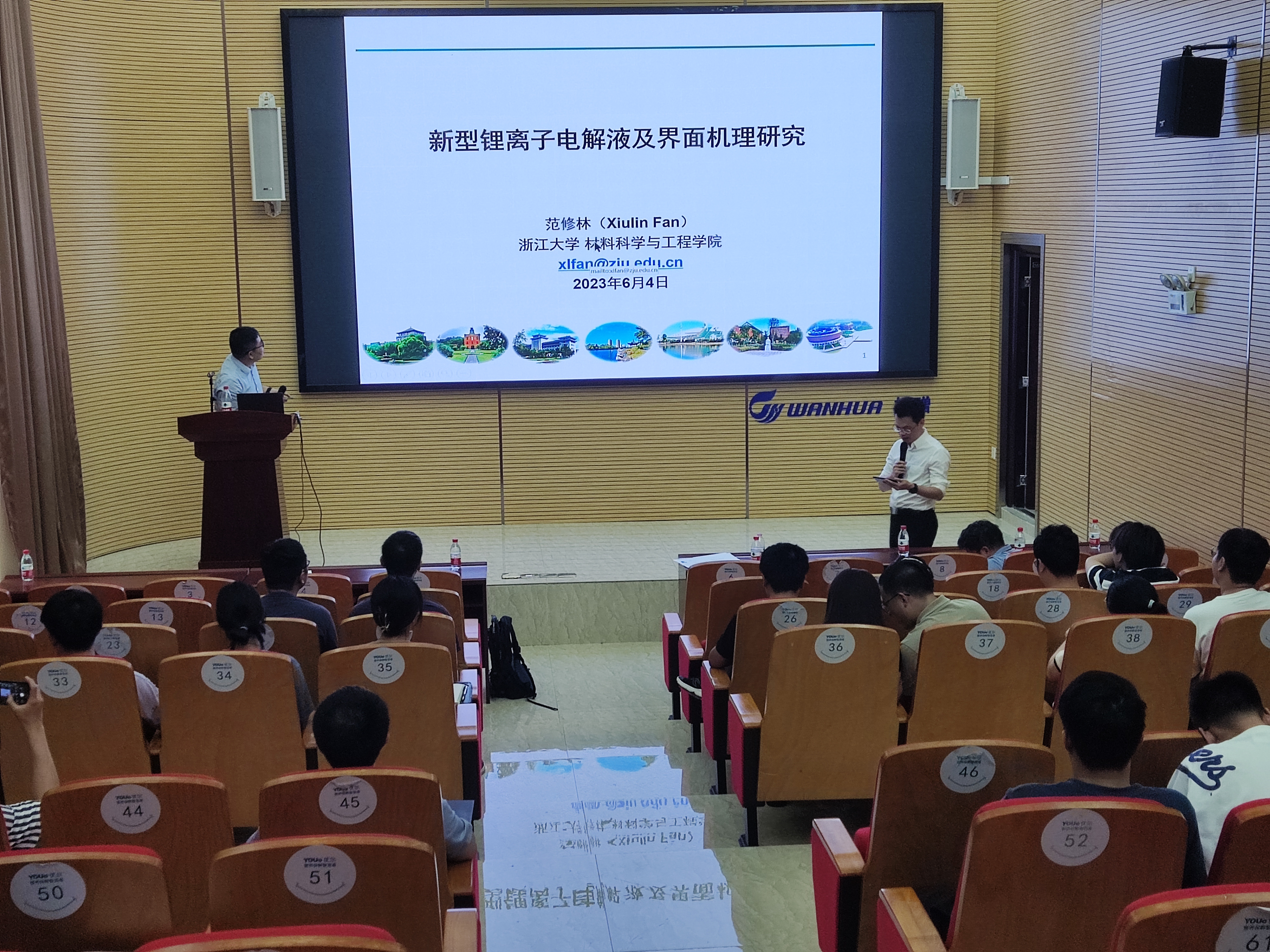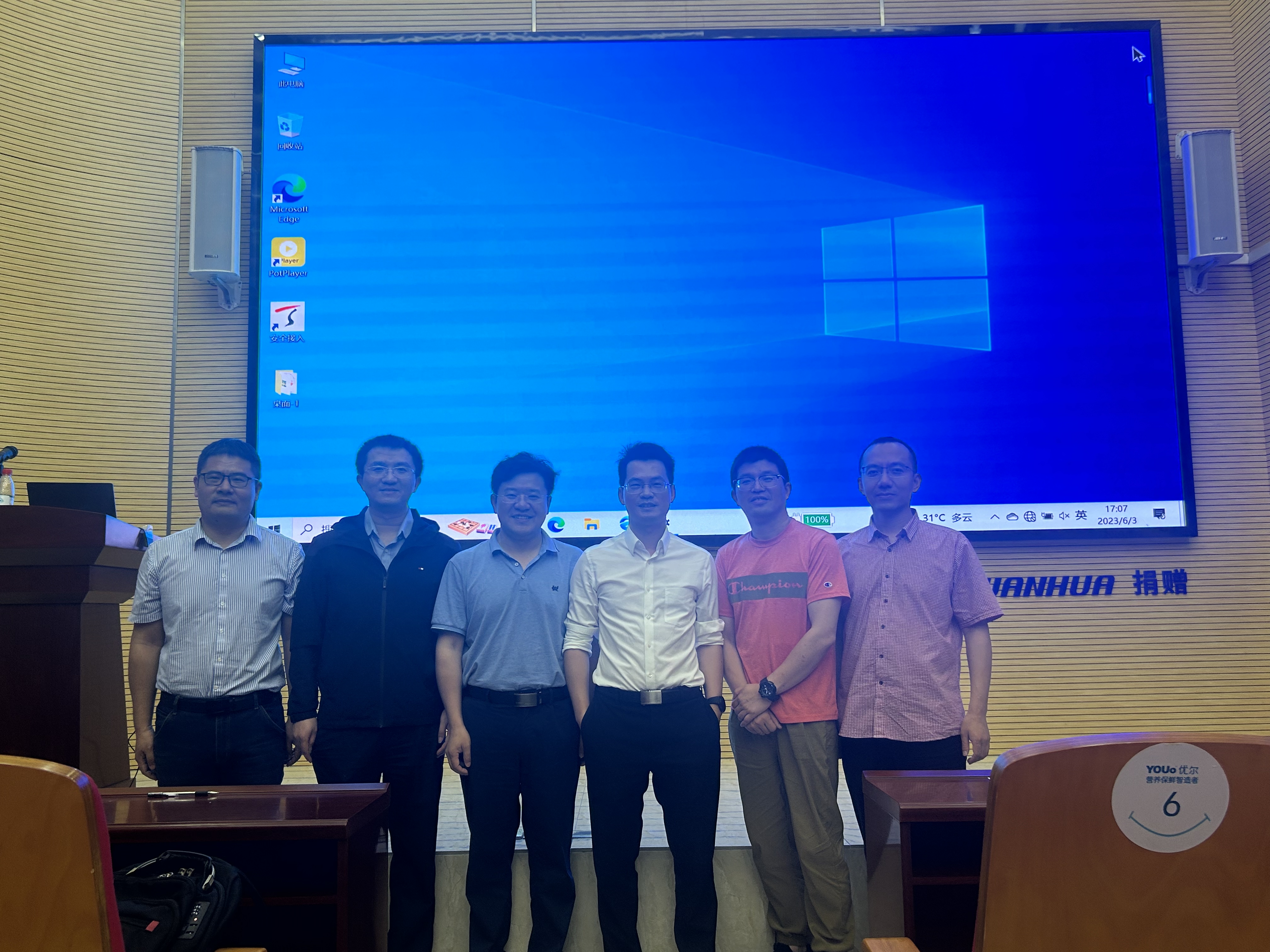On June 3, 2023, invited by Professor Tang Yuxin from Fuzhou University, Associate Professor Zhou Guangmin from Shenzhen International Graduate School of Tsinghua University, Professor Wu Xinglong from Northeast Normal University and Professor Fan Xiulin from Zhejiang University came to our group for communication and visit, and gave a wonderful academic report to the teachers and students in the South 101 Youer Lecture Hall of Quan Gang Building.
1.Associate Professor Guangmin Zhou gave a lecture entitled "Green recycling and reuse of electrode materials for lithium-ion batteries".

Lecture scene
With the popularity of new energy vehicles and various electronic devices, the use of lithium-ion batteries has shown explosive growth, which has resulted in a large number of waste lithium-ion batteries. Waste lithium batteries contain a large amount of metal resources, and improper disposal will not only cause waste of resources, but also have potential environmental risks. The existing commercial battery recycling methods are mainly thermal and wet recycling methods, both of which require re-extraction of the electrode material structure in the failed battery after destruction to the atomic level for the preparation of new electrode materials, which is a long process and high cost, and involves the application of extreme conditions such as high temperature and strong acid, with worrying economic and environmental benefits. It is a major challenge in the field of battery recycling to develop innovative and clean recycling methods, simplify the recycling process and develop ways to reuse the recovered products.
In response to the defects of existing recycling methods, Associate Professor Guangmin Zhou proposed the idea of direct recycling of electrode materials at the molecular scale, and designed innovative recycling methods such as direct repair of failed lithium cobaltate cathodes with low eutectic solvent, repair of ternary cathodes with high failure degree with low temperature molten salt, regeneration of failed lithium iron phosphate with multifunctional solvent heat and organic lithium salt; and closed-loop design for the matching direct recycling process. In addition, it proposes a high-value utilization path for the transformation of failed electrode materials to high-performance electrode materials, nano-catalysts and other products, which greatly simplifies the recycling process and circumvents the use of extreme conditions, providing a new technical system and theoretical guidance for battery recycling research and industry.
2. Professor Xinglong Wu gave a lecture entitled "Phosphate cathode materials and their whole life cycle reuse".

Lecture scene
In alkali metal ion batteries based on the "rocking chair" energy storage mechanism, the electrode material (especially the cathode material) plays a key role in the storage characteristics of alkali metal ions. For phosphate cathode materials, which are mainly covalent frameworks, they still face challenges such as poor electronic conductivity and low operating voltage.
Prof. Xinglong Wu addresses the energy storage properties such as high voltage and high energy density, long cycle life and excellent multiplicity achieved by lattice modulation (high entropy, high electronegativity anion substitution, isomeric anion doping, non-equivalent cation doping, etc.), precise carbon network construction and anion-cation relaying composite design strategies for phosphate cathode materials in sodium ion batteries, and analyzes the enhancement mechanism involved. In addition, for phosphate cathode based waste lithium-ion batteries, we propose new ideas such as simultaneous reuse of positive/negative electrodes to achieve green recovery and recycling of "waste to treasure".
3. Prof. Xiu-Lin Fan gave a lecture entitled "Research on new lithium-ion electrolyte and interface mechanism".

Lecture scene
The current commercial EC-based electrolytes are highly susceptible to oxidation on the cathode surface above 4.3 V and cannot form a stable cathode electrolyte film (CEI), which seriously hinders the development of high-voltage, high-energy density lithium batteries. In addition, among all possible cathode materials, Li metal, graphite and Si have their own characteristics, but the mechanism of reaction with electrolyte interface is different, so it affects the electrochemical performance of the whole battery.
Professor Fan Xiulin tried to analyze the intrinsic mechanism of this series of reactions from the perspective of electrolyte composition, composition, microstructure and interfacial reactions.
The presentations of the three teachers aroused the keen interest of the participating teachers and students, and the participants actively participated in the discussion session and had in-depth exchanges with the professors on the research in related fields, which further promoted academic cooperation and discipline development.
The exchange event provided a valuable platform for academic exchange among the faculty and students of Fuzhou University. Through the sharing and discussion of academic reports, it promoted interdisciplinary cooperation and the sharing and innovation of scientific research results. It is believed that such exchanges and cooperation will further promote the development of the field of electrochemical energy storage and lay a solid foundation for future scientific breakthroughs.

Group photo
